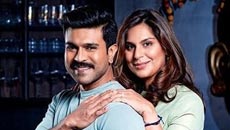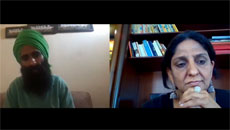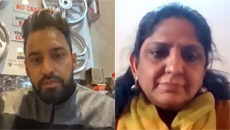How would you describe your film Rajneeti?
Rajneeti was not just an idea. The subject of Rajneeti was in my mind for a long time. Though I was trying to work out a nice story, I was very particular at the same time that I did not want to make a preachy political film which talks about corruption in politics.
Rajneeti is basically about the politics of mind. It deals with how we continue to play politics with each other, manipulate and maneuver and betray friendships. It is about how each relationship is manipulated to suit our gains. Rajneeti is not a political film though the back drop is an election.
Rajneeti has strong women characters. It is not that I make only hero oriented films. Do not forget that I had earlier made Mrityudand with Madhuri Dixit. Rajneeti has strong women characters played by Katrina Kaif, Sarah Thomas and Nikhila Trikha, who plays the role of Ranbir Kapoor's mother.
How did you achieve the casting coup in Rajneeti?
People say that I have done a casting coup as far as Rajneeti is concerned. All the actors in Rajneeti, whether it is Nana Patekar or Naseeruddin Shah, Ajay Devgn or Arjun Rampal, Katrina Kaif or Ranbir Kapoor or for that matter Manoj Bajpai suited the roles and fitted the characters that I had envisaged for them.
I am fortunate that they like to work with me. For me, the story is above everything even above me. I do not cast an actor just because I like him or her. I had seen Katrina Kaif only in Welcome, because Nana Patekar had shown the film to me.
Katrina was the only one who could play the role of Indu in Rajneeti. Ranbir Kapoor is one actor who is very secure and confident
Is Katrina playing the role of Sonia Gandhi in Rajneeti?
 Everything that you set out to create as a writer has to come from somewhere. As the old dictum goes, nothing can
be created and nothing can be destroyed. Yet I'd say that my film has got nothing to do with Sonia Gandhiji.
Everything that you set out to create as a writer has to come from somewhere. As the old dictum goes, nothing can
be created and nothing can be destroyed. Yet I'd say that my film has got nothing to do with Sonia Gandhiji.On the contrary, the characters in Rajneeti are inspired by the characters from the epic Mahabharat. Katrina Kaif is not playing the role of Sonia Gandhi. The role that she is playing in my film is loosely inspired by Draupadi.
How would you evaluate your growth as a film maker?
For me, as a filmmaker, every day of work is a new challenge. You keep hoping it works. I cannot sit comfortably thinking that I have found my groove and stop growing as a filmmaker.
I make a film to communicate with the audiences. I only try to tell a story which I think should be told. If you ask me to evaluate my growth as a maker over the years, it would be difficult for me to do it because I do not think I can be my own judge.
You have watched me growing as a filmmaker from Damul. You should tell me about my growth as a filmmaker.
What is your secret mantra to extract performances out of your actors?
As a filmmaker, I try to communicate with my actors and let them do what they want to do. I need to make sure that everyone understands what I see.
 My job is not to let them drift but keep them there within the graph of the
characters that they play. I just concentrate on the work on the sets. It is my job to inspire my actors. There are as
many as seventeen departments of filmmaking. Why should I be stern?
My job is not to let them drift but keep them there within the graph of the
characters that they play. I just concentrate on the work on the sets. It is my job to inspire my actors. There are as
many as seventeen departments of filmmaking. Why should I be stern?How did you patch up with the temperamental Nana Patekar?
By talking to one another we patched up. Sometimes, somewhere misunderstanding can crop up between friends. Nana has done a wonderful job.
It is not true that I kept him away from the promotions. If he did not interact with the media, it is because he chose not to. Nana has expressed his desire to direct a film for me. If his script is ready, I will be only too glad to go ahead and make a film with him.
Has your approach as a director changed over the years from Damul to Rajneeti?
I do not think that my approach as a director has improved over the years, though let me reiterate that it has not changed from the time I made my debut as a filmmaker with Damul. For me, every day is a fresh day. I think I am the same guy who had earlier made films like Damul and Hip Hip Hurray.
You grow as a director in the sense you keep on simplifying your narrative. I would say that it is a continuous process of learning for me as a filmmaker. I am always excited to go to the shooting and do as much as possible. It is true that it helps if you can write and visualize as a director.
Why only writing and directing besides production, when I make a film, I like to get involved in each and every aspect of my film, including editing. As a maker I only present a problem as it exists in my films and do not believe in showing solutions to the problems because I am not God.
Why did you shift genres after Rahul and Dil Kya Kare to making films like Apaharan and Rajneeti, which have political backdrop?
 Though I am known for my seething political satires like Apaharan, Gangajal, Rajneeti etc, because my films tend to
be social and political, I am also working on a subject on relationship. I am also toying with the idea of making a
comedy film.
Though I am known for my seething political satires like Apaharan, Gangajal, Rajneeti etc, because my films tend to
be social and political, I am also working on a subject on relationship. I am also toying with the idea of making a
comedy film.I confess that I have not made films as frequently as I think I should have. There are various reasons for it. One of them is that I have been busy dabbling in politics and hence could not devote time to films. I also have my other social commitments. I am also busy with my own channel
What next?
My next film as a producer- Turning 30 is an interesting film on coming of age. My associate director Alankrita Srivastav has written and directed the film which is about the dilemma and pressures of a woman when she turns 30. I am now planning to launch Aarakshan with Amitabh Bachchan, Ajay Devgn and Manoj Bajpai. It is about reservation of opportunities.








 Chhorii 2 Movie Review: A Missed Opportunity in the Horror Thriller Genre!
Chhorii 2 Movie Review: A Missed Opportunity in the Horror Thriller Genre! Jaat Review: A Power-Packed Action Drama Led by Sunny Deol's Unmatched Screen Presence!
Jaat Review: A Power-Packed Action Drama Led by Sunny Deol's Unmatched Screen Presence! 'The Bhootnii' Announces New Release Date Amid VFX Enhancements!
'The Bhootnii' Announces New Release Date Amid VFX Enhancements! Neha Sharma Embraces Tranquility in the Maldives Amid Serene Getaway!
Neha Sharma Embraces Tranquility in the Maldives Amid Serene Getaway! Salman Khan Receives Fresh Death Threat, Sender Located in Gujarat's Vadodara!
Salman Khan Receives Fresh Death Threat, Sender Located in Gujarat's Vadodara! Salman Khan's Fitness Game Is Stronger Than Ever!
Salman Khan's Fitness Game Is Stronger Than Ever! ZEE5 Unveils Teaser of 'Costao': A Riveting Tale of Courage and Justice!
ZEE5 Unveils Teaser of 'Costao': A Riveting Tale of Courage and Justice! Rajkummar Rao and Wamiqa Gabbi light up the screen with their chemistry in Koi Naa from Bhool Chuk Maaf!
Rajkummar Rao and Wamiqa Gabbi light up the screen with their chemistry in Koi Naa from Bhool Chuk Maaf! Amitabh Bachchan's Emotional Tribute to Son Abhishek's Heartfelt Gift: A Pen That Speaks Volumes in a Digital World!
Amitabh Bachchan's Emotional Tribute to Son Abhishek's Heartfelt Gift: A Pen That Speaks Volumes in a Digital World! Bollywood's Bright Future: Meet the Rising Stars!
Bollywood's Bright Future: Meet the Rising Stars! Bollywood's Burden of Legacy: Star Kids Who Stumbled on Debut
Bollywood's Burden of Legacy: Star Kids Who Stumbled on Debut Most-Anticipated Bollywood Movies to Watch in February 2025
Most-Anticipated Bollywood Movies to Watch in February 2025 Ranbir can't say F**K, Katrina can't make Love
Ranbir can't say F**K, Katrina can't make Love  There's a dramatic change in Ranbir's public conduct
There's a dramatic change in Ranbir's public conduct  Why Ajay Devgn is upset with Ranbir-Katrina romance
Why Ajay Devgn is upset with Ranbir-Katrina romance